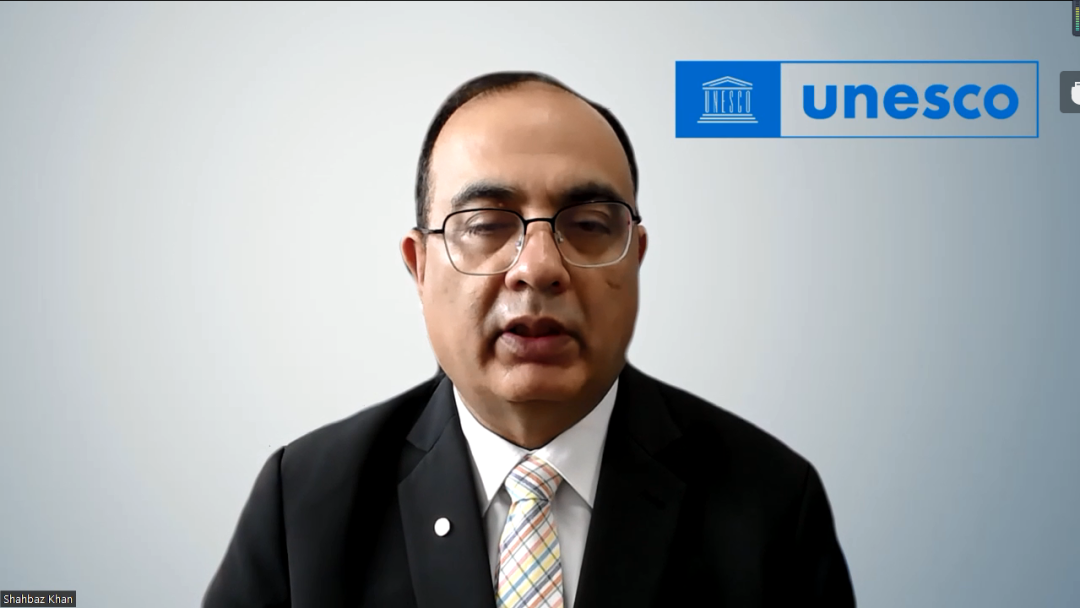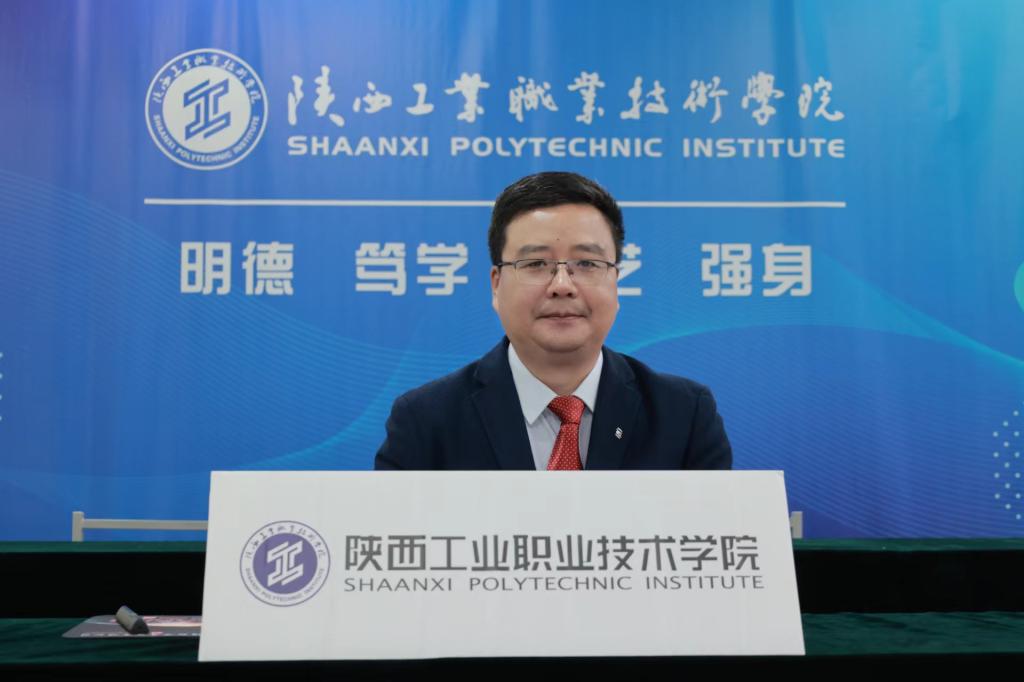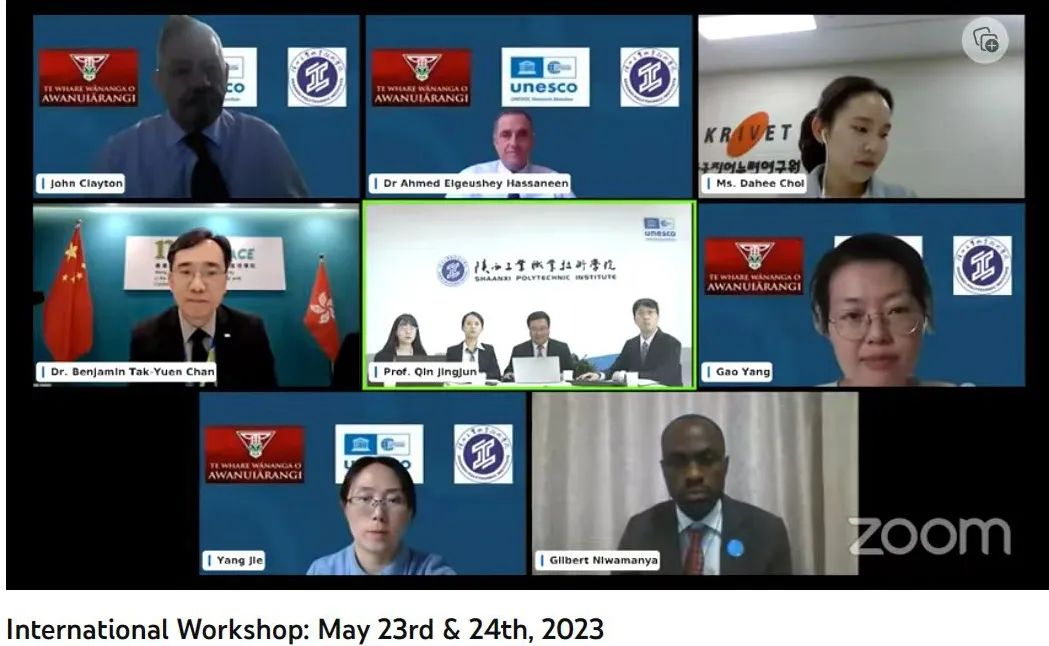The virtual international workshop on Incorporating a Global Citizenship Education(GCED) Approach into TVET Learning Environmentswas held by the UNEVOC Center at Shaanxi Polytechnic Institute (SXPI) of the Peoples’ Republic of China in conjunction with UNESCO Beijing office, the UNESCO-UNEVOC International Centre, and Te Whare Wananga o Awanuiārangi,New Zealand.This was the first GCED workshop held ever since SXPI was approved as UNEVOC Center in 2022and as the most recent member of the UNEVOC Network in China. This workshop brought together researchers, professors, TVET experts from academia and the world of work, policy makers and political leaders from across the globe, directors and specialists from UNESCO offices around the world, scholars and students from all over the world.

In his speech,Professor Shahbaz Khan,the Representative and Director of UNESCO Beijing Office, thanked Shaanxi Polytechnic Institute, the UNESCO-UNEVOC International Centre, and Te Whare Wananga o Awanuiārangi, New Zealand for organizing the workshop.
He welcomed all participants, acknowledged the partnership and collaboration between UNESCO-UNEVOC and SXPI. "The GCED in TVET is one of the UNESCO’s responses and everyone has to reimagine the TVET in this post COVID era. We need to install good values and better attitudes in learners and behaviors that can support responsibility and development of peace. Use GCED values to enable TVET graduates to secure jobs in any part of the world. We need the 21st century education linked with the 4th industrial revolution combined with Technical and soft skills together provided by GCED.GCED offers key attributes in labour market that are inclusive and sustainable for all.The major challenges in TVET are to integrate GCED in TVET curricula. " The workshop was very relevant to build insights into practices and ideas to integrate GCED in TVET.

Dr Friedrich Huebler,the UNESCO-UNEVOC Head of office Bonn, Germany, presented an overarching statement that the workshop was in line with new UNESCO strategy (2022-2029) that focuses on three main lines of action.
He emphasized the lines of action as“Develop skills for all individuals to learn, work and live”, “Develop skills for inclusive and sustainable economies” and “Develop skills for inclusive and peaceful societies”. He said that UNESCO has promoted TVET institutions as places for social integration and cohesion as contribution to building a more peaceful tolerant world. SXPI is making a relevant and timely contribution to the activities of the UNESCO-UNEVOC and the UNEVOC network. He further emphasised that cultural awareness was an important skill that the world would all strive to develop along with technical skills that were taught in TVET institutions of learning and that the workshop was a meeting point for industry and government agencies, education leaders, politicians, practitioners and learners to share their experiences, strengthen international collaboration and plan the development of future initiatives and project related to outcomes based cultural awareness and Global Citizenship Education in TVET.

Mr. Robert Parua, who isan Education Specialist in the UNESCO Multisectoral Regional Office for East Asia that covers China, South Korea, Democratic Republic of Korea (DPRK), Mongolia and Japan, thanked the organizers of the workshop.
He called on all leaders of academic institutions for their visionary leadership and unwavering dedication to nurture GCED programs that wouldfoster quality TVET systemsas potential change drives in shaping the educational landscape and equipping the youth with the skills they need to succeed in the workforce and promoting lifelong learning, youth and work.

Ms. Maggie Yang, Programme Specialist of the Office of External Relations and Informationat the Asia-Pacific Centre of Education for International Understanding (APCEIU), commended SXPI for the initiative to incorporate GCED in TVET learning environments.
She emphasized a fresh perspective of the importance of using collaboration and knowledge sharing through virtual workshop spaces as potential tools to raise awareness on how GCED could be incorporated in TVET learning environments. Using the experience of APCEIU, she made a key point on the need by all TVET stakeholders to consistently use research and development to ensure GCED well interpreted in the TVET curricula and TVET implementation. She highlightedpartnership and networking as very key agenda in transforming TVET for learning to live together and strengthening citizenship valuesthrough the teaching of GCED. She mentioned that APCEIU developed different media to disseminate GCED information, including the famous GCED clearing house, the website that hosts all GCED online programs that are certified, free delivered online by quality professors in addition to offline programs that are offered at APCEIU in Seoul.

Mr. Qin Jingjun, the head of SXPI UNEVOC Centre and Dean of International Education School,welcomed all distinguished directors, speakers and attendees from all over the world.
He informed the workshop that by working with Te Whare Wananga o Awanuiārangi, New Zealand, the UNEVOC Centre at Shaanxi Polytechnic Institute planned the Center workshop that emphasised the theme on Incorporating a Global Citizenship Approach into TVET Learning Environments. The workshop which was supported by UNESCO Beijing office, UNESCO-UNEVOC International Centre, and Te Whare Wananga o Awanuiārangi,New Zealand was part of the SXPI UNEVOC Centre 2023/24 Biennial Plan.

Professor Michael Zhang,the regional Director Greater China ENZ, who once served as Acting Consul-General in Guangzhou and Deputy Consul-General in Chengdu, thanked Te Whare Wananga o Awanuiārangi and SXPI for successfully organizing the workshop.
“New Zealand is making reforms in TVET to improve innovation and technology. They ensure that the TVET system graduates a skilled workforce that is able to sustain the economy. Dialogue between institutions and stakeholders will continue to get best solutions for our youths.” He said thatincorporating GCED approach in TVET instruction would produce all round workers that would promote peace and build sustainable societies using skills, knowledge and attitude.
The workshop attracted prominent speakers from all over the world. Prof Dr. Ahmed Elgeushey Hassaneen (Helwan University Egypt), Dr. John Clayton (SXPI Visiting Professor and Mark Laws Endowed Chair Te Whare Wananga o Awanuiārangi,New Zealand), Prof. Yang Jie (Associate professor, School of Finance, Economics and Tourism at Shaanxi Polytechnic Institute, China), Dr. Benjamin Chan (Dean of the Hong Kong Metropolitan University Li Ka Shing School of Professional and Continuing Education), Ms. Dahee Choi (KRIVET Coordinator of UNEVOC Network, Republic of Korea), Prof. Gao Yang (TVET Researcher from Tianjin City Vocational College, China) and Jun Iwata (professor in the Department of Medical English Education at the Faculty of Medicine, Shimane University, Japan), and speakers at this workshop.

Throughout the workshop, key themes emerged, emphasizing the significance of GCED and culture diversity, values development and implementing a sustainable TVET. Participants had the opportunity to share case studies and authentic examples of GCED in action from Hong Kong Metropolitan University, Korea Research Institute for Vocational Education & Training of UNEVOC Network, Shimame Medical University and Shaanxi Polytechnic Institute (PRC). Central to the implementation, the workshop shared templates on incorporating culture and GCED in curriculum design, assessment and in evaluation of learning.The workshop also explored the use of the triple loop reflection cycle to enable educators use their own reflection of learning and relate their experiences to the scenarios they find in the educational environment.The insights gained from the virtual workshop will undoubtedly formulate part of the evidence base for a forthcoming UNESCO-UNEVOC trend in incorporating a GCED approach in TVET learning environments across the world.

In his closing remarks, the head of Shaanxi Polytechnic Institute UNEVOC Center, Qin said that Incorporating GCED approaches inTVET is a catalyst for innovation, economic growth, and social development, providing individuals with the necessary skills to thrive in an ever-changing world.He thanked all speakers, presenters and attendees for which he said that the collective wisdom and expertise gathered at the workshop will further reinforce the significance of fostering robust TVET systems that empower individuals, bridge skills gaps, and pave the way for inclusive and sustainable development.

In conclusion, the workshop's success is attributed to the invaluable contributions of the main speakers, whose expertise and thought leadership guided the discussions and provided innovative perspectives. Their presentations, enriched with research findings, real-life examples on GCED integration, and practical strategies, offered participants valuable insights and actionable takeaways on incorporating a GCED approach in TVET learning environment.